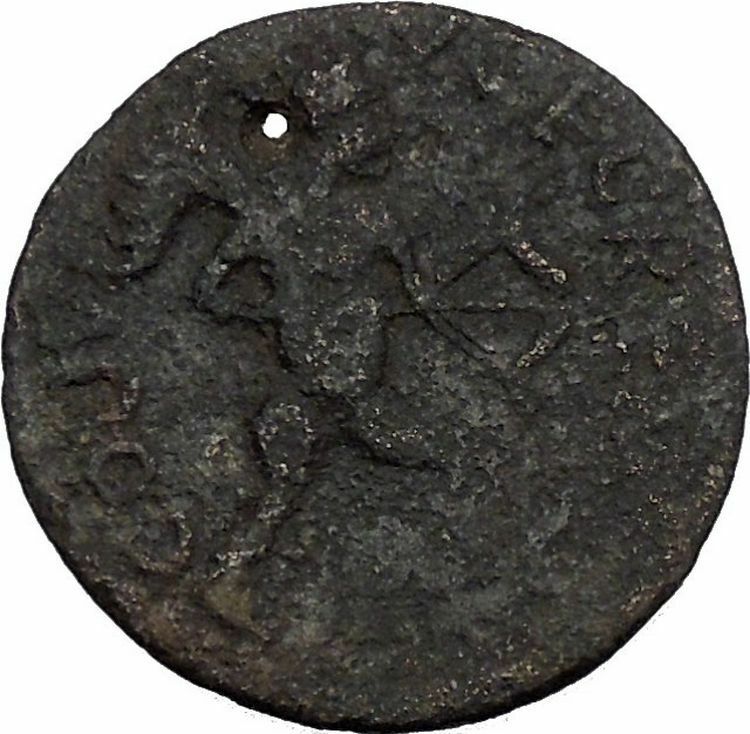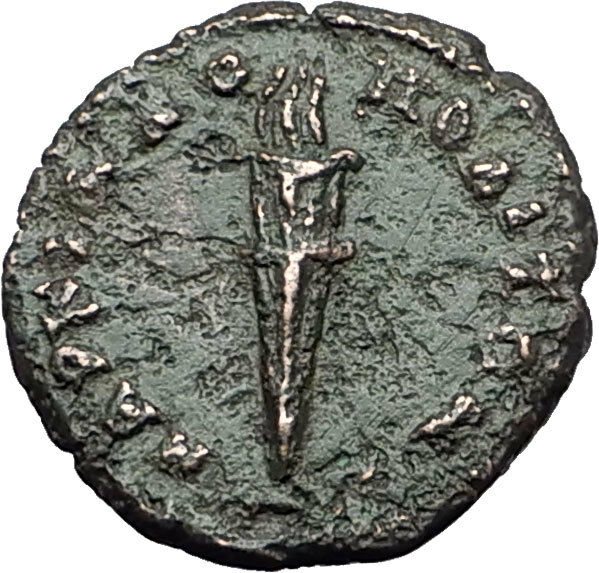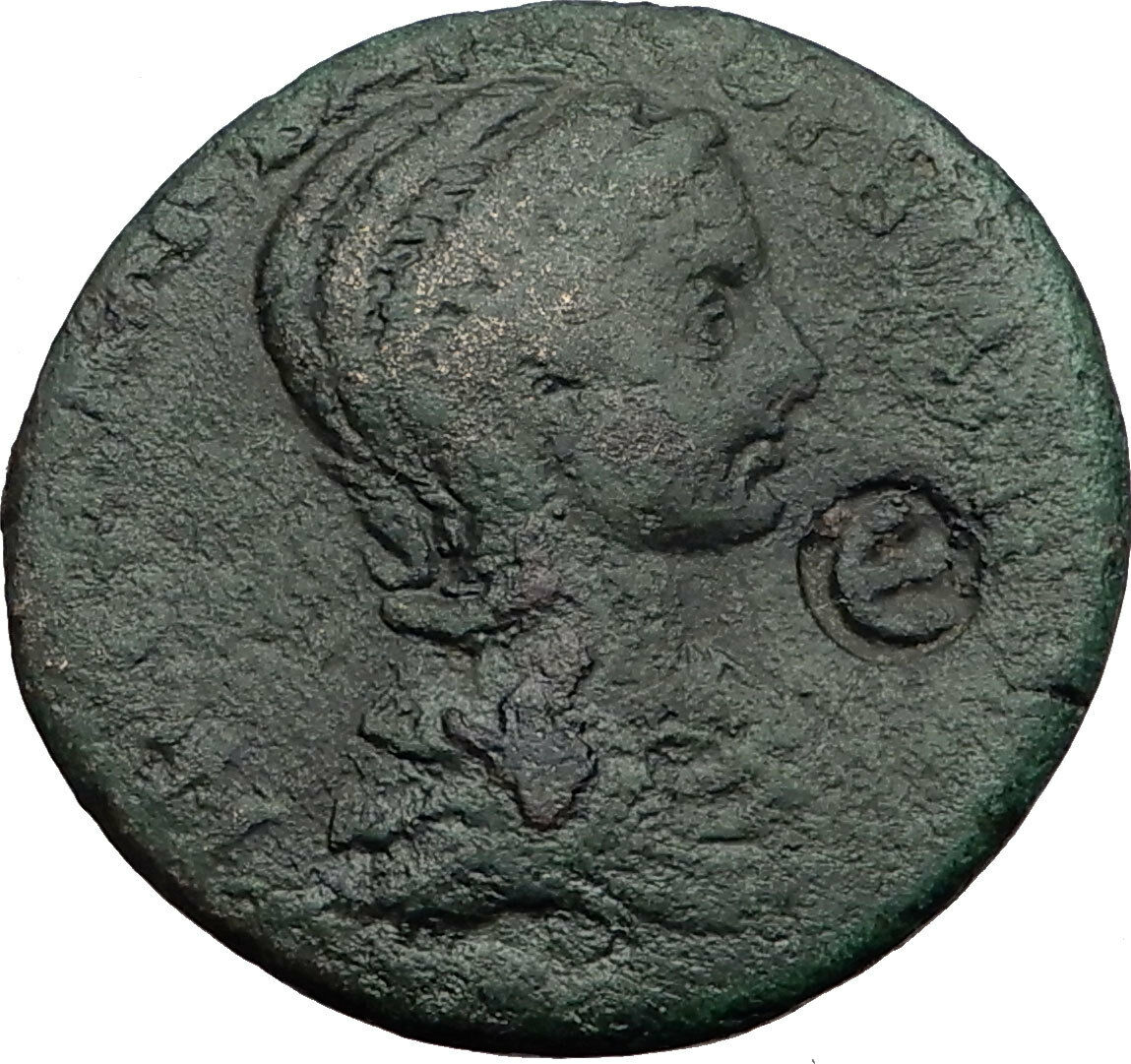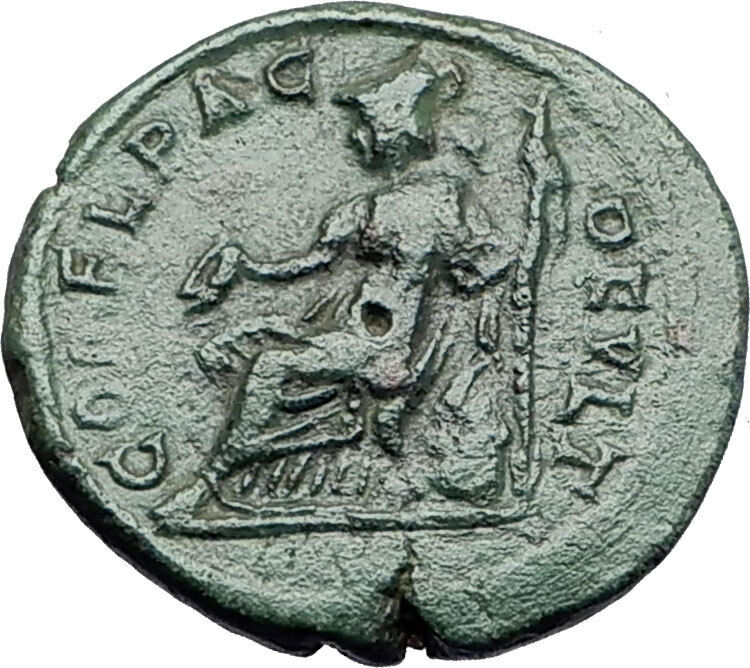|
Antoninus Pius – Roman Emperor: 138-161 A.D.
Bronze 24mm (8.73 grams) of Laodiceia ad Mare in Seleucis and Pieria
Reference: Sear GIC 1497
AVTO, KAI. TI. AIΛΙ. AΔΡΙ. ANTWNЄINOC CЄB, Laureate, draped and cuirassed bust left; head countermark on neck.
IOVΛIЄWN TWN KAI ΛAOΔIKЄWN, Turreted bust of City-goddess left; in field to left, ΘЄ; to right, HΠP (= year 188 of the Caesarean Era = A.D. 140/1).
You are bidding on the exact item pictured, provided with a Certificate of Authenticity and Lifetime Guarantee of Authenticity.
 Antoninus Pius – 138-161 A.D. Antoninus Pius – 138-161 A.D.
Caesar: 138 A.D. (under Hadrian)
Augustus: 138-161 A.D.
| Adopted son and successor of Hadrian | Husband of Faustina Senior | Father of Faustina Junior and Galerius Antoninus | Grandfather of Commodus, Annius Verus, Lucilla and Aurelius Antoninus | Adoptive father of Marcus Aurelius and Lucius Verus |
Titus Aurelius Fulvus Boionius Arrius Antoninus (19 September 86 – 7 March 161), generally known in English as Antoninus Pius was Roman emperor from 138 to 161. He was the fourth of the Five Good Emperors and a member of the Aurelii. He did not possess the sobriquet “Pius” until after his accession to the throne. Almost certainly, he earned the name “Pius” because he compelled the Senate to deify his adoptive father Hadrian; the Historia Augusta, however, suggests that he may have earned the name by saving senators sentenced to death by Hadrian in his later years.
On his accession, Antoninus’ name became “Imperator Caesar Titus Aelius Hadrianus Antoninus Augustus Pontifex Maximus”. One of his first acts as Emperor was to persuade the Senate to grant divine honours to Hadrian, which they had at first refused; his efforts to persuade the Senate to grant these honours is the most likely reason given for his title of Pius (dutiful in affection; compare pietas). Two other reasons for this title are that he would support his aged father-in-law with his hand at Senate meetings, and that he had saved those men that Hadrian, during his period of ill-health, had condemned to death. He built temples, theaters, and mausoleums, promoted the arts and sciences, and bestowed honours and financial rewards upon the teachers of rhetoric and philosophy.
In marked contrast to his predecessors Trajan and Hadrian, Antoninus was not a military man. One modern scholar has written “It is almost certain not only that at no time in his life did he ever see, let alone command, a Roman army, but that, throughout the twenty-three years of his reign, he never went within five hundred miles of a legion”. His reign was the most peaceful in the entire history of the Principate; while there were several military disturbances throughout the Empire in his time, in Mauretania, Iudaea, and amongst the Brigantes in Britannia, none of them are considered serious. The unrest in Britannia is believed to have led to the construction of the Antonine Wall from the Firth of Forth to the Firth of Clyde, although it was soon abandoned. He was virtually unique among emperors in that he dealt with these crises without leaving Italy once during his reign, but instead dealt with provincial matters of war and peace through their governors or through imperial letters to the cities such as Ephesus (of which some were publicly displayed). This style of government was highly praised by his contemporaries and by later generations.
Of the public transactions of this period we have scant information, but, to judge by what we possess, those twenty-two years were not remarkably eventful in comparison to those before and after his; the surviving evidence is not complete enough to determine whether we should interpret, with older scholars, that he wisely curtailed the activities of the Roman Empire to a careful minimum, or perhaps that he was uninterested in events away from Rome and Italy and his inaction contributed to the pressing troubles that faced not only Marcus Aurelius but also the emperors of the third century. German historian Ernst Kornemann has had it in his Römische Geschichte [2 vols., ed. by H. Bengtson, Stuttgart 1954] that the reign of Antoninus comprised “a succession of grossly wasted opportunities,” given the upheavals that were to come. There is more to this argument, given that the Parthians in the East were themselves soon to make no small amount of mischief after Antoninus’ passing. Kornemann’s brief is that Antoninus might have waged preventive wars to head off these outsiders.
Scholars place Antoninus Pius as the leading candidate for fulfilling the role as a friend of Rabbi Judah the Prince. According to the Talmud (Avodah Zarah 10a-b), Rabbi Judah was very wealthy and greatly revered in Rome. He had a close friendship with “Antoninus”, possibly Antoninus Pius, who would consult Rabbi Judah on various worldly and spiritual matters.
After the longest reign since Augustus (surpassing Tiberius by a couple of months), Antoninus died of fever at Lorium in Etruria, about twelve miles (19 km) from Rome, on 7 March 161, giving the keynote to his life in the last word that he uttered when the tribune of the night-watch came to ask the password-“aequanimitas” (equanimity). His body was placed in Hadrian’s mausoleum, a column was dedicated to him on the Campus Martius, and the temple he had built in the Forum in 141 to his deified wife Faustina was rededicated to the deified Faustina and the deified Antoninus.
Antoninus in many ways was the ideal of the landed gentleman praised not only by ancient Romans, but also by later scholars of classical history, such as Edward Gibbon or the author of the article on Antoninus Pius in the ninth edition of the Encyclopedia Britannicaca:
A few months afterwards, on Hadrian’s death, he was enthusiastically welcomed to the throne by the Roman people, who, for once, were not disappointed in their anticipation of a happy reign. For Antoninus came to his new office with simple tastes, kindly disposition, extensive experience, a well-trained intelligence and the sincerest desire for the welfare of his subjects. Instead of plundering to support his prodigality, he emptied his private treasury to assist distressed provinces and cities, and everywhere exercised rigid economy (hence the nickname κυμινοπριστης “cummin-splitter”). Instead of exaggerating into treason whatever was susceptible of unfavorable interpretation, he spurned the very conspiracies that were formed against him into opportunities for demonstrating his clemency. Instead of stirring up persecution against the Christians, he extended to them the strong hand of his protection throughout the empire. Rather than give occasion to that oppression which he regarded as inseparable from an emperor’s progress through his dominions, he was content to spend all the years of his reign in Rome, or its neighborhood.
|




 Antoninus Pius – 138-161 A.D.
Antoninus Pius – 138-161 A.D.




